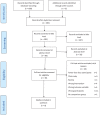School Based Motor Skill Interventions for Developmentally Delayed and Non-Delayed Children
- PMID: 34841010
- PMCID: PMC8613880
- DOI: 10.1177/2333794X211057707
School Based Motor Skill Interventions for Developmentally Delayed and Non-Delayed Children
Abstract
Introduction: A mere 33% of all children meet the recommended minimum physical activity guidelines for adequate health maintenance. Available literature however suggests children are more likely to be active when they are competent with their own motor ability. This review aimed to evaluate how several regimented motor skills training courses and interventions improve motor skill competence among children compared with age matched control peers. Method: Electronic databases were searched and included Medline Complete and Psych INFO (both hosted by EBSCO Host). The search syntax examined titles and abstracts. The study aimed to create novelty by examining participants with and without developmental delays simultaneously from studies around the globe. Included interventions were aimed at the most crucial developmental years for children (between 3 and 11 years). Results: Results were found in favor of the motor skill intervention groups (from pre-to post-test). Included interventions involved weekly motor skills exposure of 60 to 120 minutes for periods of between 2 and 6 months. Over 50% of included interventions involved alterations to current school curriculums. The included studies were of moderate to high quality. Conclusion: The findings suggest that for those with and without developmental delays, several interventions can be effectively applied in once weekly 60-minute sessions (over eight or more weeks) to improve children's motor skill abilities. Applying appropriate difficulty to interventions seems equally influential. Implications are discussed.
Keywords: child; children; intervention; motor ability; motor skills; physical activity; systematic review.
© The Author(s) 2021.
Conflict of interest statement
Declaration of Conflicting Interests: The author declared no potential conflicts of interest with respect to the research, authorship, and/or publication of this article.
Figures

References
-
- Australian Bureau of Statistics (ABS). Australian health survey: physical activity. 2013. Accessed April 10, 2017. http://www.health.gov.au/internet/main/publishing.nsf/content/health-pub...
-
- Barnett LM, van Beurden E, Morgan PJ, Brooks LO, Beard JR. Childhood motor skill proficiency as a predictor of adolescent physical activity. J Adolesc Health. 2009;44(3):252-259. - PubMed
Publication types
LinkOut - more resources
Full Text Sources

